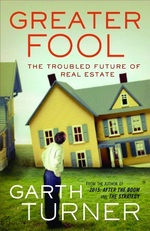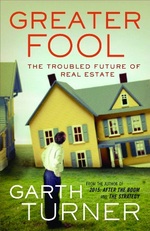John in Toronto Real Estate News
 There’s a new book on the market that is sure to satisfy Toronto real estate bubble theorists. While I haven’t read it yet, recent media reports suggest that MP Garth Turner’s Greater Fool warns Canadians of a US style real estate collapse in Canada.
There’s a new book on the market that is sure to satisfy Toronto real estate bubble theorists. While I haven’t read it yet, recent media reports suggest that MP Garth Turner’s Greater Fool warns Canadians of a US style real estate collapse in Canada.
From the National Post:
In a nutshell, Turner urges his Canadian readers to sell their real estate if it makes up much more than a third of total family net worth and consider renting until the storm passes.
But don’t run out and sell your houses quite yet. It appears as though the only authority who believes Turner’s doom and gloom theory is, well, Garth Turner himself. From The Star:
But try to find a respected Canadian economist who buys into Turner's pessimism. People at the University of Toronto's economics department, the Ivey School of Business at the University of Western Ontario and University of British Columbia's Centre for Urban Economics and Real Estate couldn't find one for us.
While most seem to think a gradual softening is likely after 10 years of constant price increases, a U.S.-style meltdown doesn't appear to be on anyone's radar.
Turner believes that zero down and 40-year mortgages have left Canadians as overleveraged as our American neighbours. But I'm curious to find out if Turner actually proves this theory in his book. Not only did the US have 40- and even 50-year amortization mortgages before Canada, but US lenders have also been offering 125% home equity loans at least since the late nineties. A 125% home equity loan means that the US bank would be willing to lend a homeowner up to 125% of the value of their home. The most Canadian banks are willing to lend home buyers is 100% of the value of a home.
I also find it interesting that Turner considers it a myth that Canadian lenders are more conservative than American lenders. If it truly is a myth, why don't Canadians have 125% home equity loans? Why don't our banks employ the same aggressive sales tactics as those used in the US? Why don't our banks push the Adjustable Rate Mortgages found in the US? Why is Negative Amortization in the US home buyers' lexicon but not in the Canadians'? Why isn't Canada in the middle of a sub-prime collapse?
I am curious to see how many of Turner's conclusions are based on actual analysis and how many are just on one person's alarmist opinions that pander to the fear and uncertainty many people have about the real estate market. A recent post on the book’s blog suggests less of the former and more of the later. Turner writes:
Interestingly enough, yesterday the latest resale numbers came out from the Canadian Real Estate Association, showing a 6% tumble in sales activity across the country last month - which amounts to an annualized collapse of more than 70%.
This is generally not how real estate statistics are reported and for good reason. There are countless factors that can impact real estate sales in any given month - like a snowy February - and even seasonally adjusted statistics may not take such factors into account. So to use one months data as the basis for an annualized figure is very misleading.
It’s a little ironic to see this from Turner, former business editor at the Toronto Sun, because he reportedly blasts the media for their coverage of the health of the real estate market. There are many reasons to be concerned about the health of the US economy, and by extension, ours. But I have yet to see a major publication be so irresponsible as to suggest that a 6% drop in home sales in February implies a 70% annualized collapse in real estate sales.
If this is any indication of the type of analysis we can expect from the book, perhaps our $16.68 is better spent elsewhere.
John Pasalis is a sales associate at Prudential Properties Plus in Toronto and a founder of Realosophy. Email John
Subscribe to the Move Smartly blog by email
Related Posts:
The US Real Estate Market Meltdown: is Toronto Next?
US Subprime Mortgage Crisis: Here's to Being Boring, Canadian-Style
March 18, 2008
Market |



